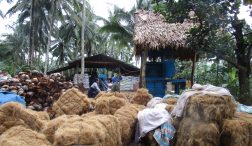


Camarines Norte, Philippines – Historically, the Bicol Region is among the top producers of coconuts in the Philippines. The province of Camarines Norte in Bicol largely depends on agriculture, with coconut as one of its main products. In the small village of Fabrica, in the town of San Vicente, Camarines Norte, many people rely on coconut farming for their livelihood–this includes the Fabrica Small Coconut Farmers Organization (FSCFO). The members of FSCFO were previously involved in copra production, and in 2015, they were introduced to coco-fiber production.
In June 2016, the Coco-Fiber Processing Facility, which processes coconut husks into dry fiber or coco peats, was established at Barangay Fabrica. The facility has the following equipment: conveyor, decorticating machine, bailing machine, screening machine, twining equipment. The facility can produce 1,000 kilograms of dried coco-fiber per day, which is directly purchased by Pilipinas Eco Fiber Corporation. The members of FSCFO sell their coconut husks to the facility and at the same time, provide twinning work in the facility. Currently, the Coco-Fiber Processing Facility employs 14 to 18 workers, depending on the production needs.
The equipment for the processing facility and the capacity building for the workers and members of FSCFO was provided by Pilipinas Eco Fiber, through the facilitation of the Federation of Coconut Farmers and Farm Workers Association for Progress (FECOFWA) formerly NIUGAN. The FSCFO, which has 55 members at present, is a local chapter organization of FECOFWA. The local government of Barangay Fabrica also supports the processing facility by providing it with resources from the agricultural development fund of the barangay.
Currently, the challenges being addressed by FSCFO in their coco-fiber production are the cost of electricity, road access in transporting coconut husks to the facility, and a more efficient production plan for their facility.

Comments are closed